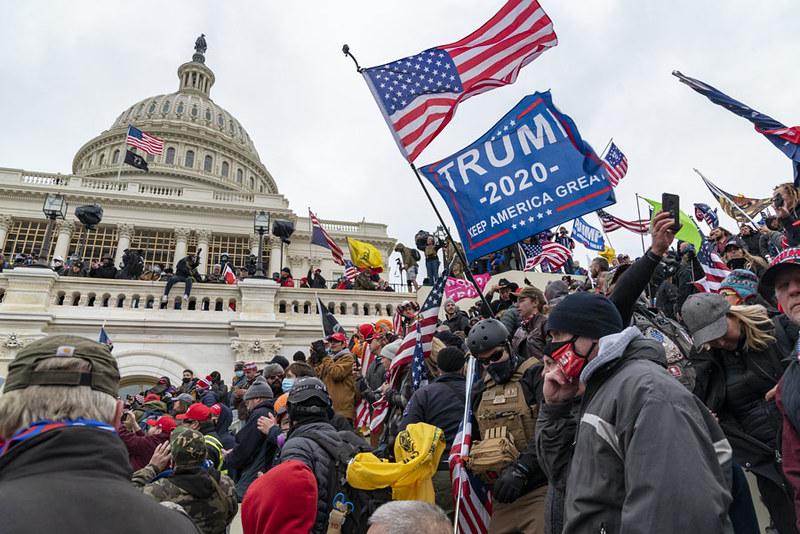A month and a week after insurrectionists infamously stormed the Capitol on Jan. 6, former President Donald Trump was acquitted by the Senate as his second impeachment came to a close Saturday, Feb. 13.
The final vote was 57 guilty to 43 not guilty. Though a majority of senators deemed Trump guilty, Senate rules dictate a supermajority – 67 votes – is required to convict.
Following the events at the Capitol, Trump faced calls for a second impeachment. U.S. Representatives David Cicilline (D-RI), Jamie Raskin (D-MD) and Ted Lieu (D-CA), introduced an article of impeachment against Trump on Jan. 11, accusing him of “incitement of insurrection” by urging his supporters to march to the Capitol.
Over the next few days, the article of impeachment gained hundreds of co-sponsors, eventually totalling 218 out of 222 House Democrats, which assured the article’s passage, as 218 votes are needed in the House to pass a bill. The article was then passed just three days later by a 232-197 vote. All 222 House Democrats voted for the article, with 10 House Republicans joining them, including House Republican Conference Chair Liz Cheney, the 3rd highest ranking Republican in the House. These 10 House Republicans voting in favor of impeachment made it the most bipartisan impeachment in history.
In the days following the vote on impeachment, then-Senate Majority Leader Mitch McConnell (R-KY) argued that because the Senate was not in session untill Jan. 19, it could not hold the Senate trial of impeachment or any other business without unanimous consent, the approval of every senator.
Then-Senate Minority Leader Chuck Schumer (D-NY) called on McConnell to bring the Senate back into session right after the House transfers the articles of impeachment, but McConnell did not answer to those calls.
Speaker of the House Nancy Pelosi announced on Jan. 22 that she would transfer the articles of impeachment to the Senate on Jan. 25, with the Senate trial expected to be held during the week of Feb. 8.
During the trial, House impeachment managers argued that the Jan. 6 insurrection was Trump’s final attempt of overturning the 2020 election and his loss, after exhausting all other options such as false claims of electoral fraud, pressuring government officials, mounting unsuccessful legal challenges, and obstructing the presidential transition. They claimed he was not an innocent bystander, rather the instigator, and through his month long attempts at overturning the election, he was laying the groundwork for the storming of the Capitol, by riling up Americans who he knew would then turn to violence.
“He built this mob over many months with repeated messaging until they believed that they had been robbed of their vote and they would do anything to stop the certification,” House impeachment manager Representative Eric Swalwell (D-CA) said during the Senate trial. “He made them believe that their victory was stolen and incited them so he could use them to steal the election for himself.”
Throughout their presentation to the senators, the House managers tried to make it clear that the responsibility for what happened on Jan. 6 lies on Trump.
“The truth is, this attack never would have happened but for Donald Trump,” Representative Madeleine Dean (D-PA) said during the trial. “And so they came, draped in Trump’s flag, and used our flag, the American flag to batter and to bludgeon.”
Trump’s defense took a combative approach. They neither sought to call the election results fraudulent nor did they defend the actions of Jan. 6. Instead, they focused their argument on claiming Trump’s words did not incite violence, that political speech must be protected and that the Senate cannot convict a private citizen under the Constitution.
The number of Republican senators who voted against Trump, seven, ended up higher than even what Trump’s legal team had anticipated, which is a stark departure from Trump’s first impeachment trial, when only one Republican senator, Mitt Romney (R-UT), voted that Trump was guilty.
This time, Republican Senators Richard Burr (NC), Bill Cassidy (LA), Susan Collins (ME), Lisa Murkowski (AK), Ben Sasse (NE), Pat Toomey (PA) and Romney voted to convict Trump.
Burr, considered the biggest surprise vote, said that while he believed the trial was unconstitutional, he decided to put that aside after the Senate voted Tuesday that the trial was constitutional and should proceed.
“As I said on Jan. 6, the President bears responsibility for these tragic events,” Burr said according to The New York Times. “The evidence is compelling that President Trump is guilty of inciting an insurrection against a coequal branch of government and that the charge rises to the level of high Crimes and Misdemeanors. Therefore, I have voted to convict.”
Before the vote though, many Republican senators stood by the president with 44 voting a few days before the acquittal vote that it was unconstitutional to convict a former president. Most Senate Republicans sided with the argument of unconstitutionality in their votes to acquit, which allowed them to avoid casting judgment based on Trump’s conduct.
Senate Minority Leader McConnell criticized Trump’s actions in front of the whole Senate shortly after the vote but McConnell said he voted to acquit because he believed impeaching an ex-president was unconstitutional.
“The Senate’s decision today does not condone anything that happened on or before that terrible day,” McConnell said according to The Washington Post. “It simply shows that senators did what the former President failed to do. We put our constitutional duty first.”
In a statement following the acquittal, President Joe Biden said that the charges brought against Trump aren’t in question and noted the bipartisan nature of the vote.
“While the final vote did not lead to a conviction, the substance of the charge is not in dispute,” Biden wrote in his statement. “Even those opposed to the conviction, like Senate Minority Leader McConnell, believe Donald Trump was guilty of a ‘disgraceful dereliction of duty’ and ‘practically and morally responsible for provoking’ the violence unleashed on the Capitol.”
Trump’s attorney Michael van der Veen, however, said the former President was “vindicated” by Saturday’s vote to acquit him.
“He had a good day in court today. He was vindicated. He was found not guilty,” van der Veen said according to CNN. “The political witch hunt that they had, that the Democrats had thrown at him was defeated, so he should feel quite pleased.”
Trump released a statement as well, thanking his lawyers and the senators who voted to acquit him.
“I want to first thank my team of dedicated lawyers and others for their tireless work upholding justice and defending truth,” Trump said according to NPR. “My deepest thanks as well to all of the United States Senators and Members of Congress who stood proudly for the Constitution we all revere and for the sacred legal principles at the heart of our country.”
But the House impeachment managers weren’t disappointed by the vote, citing the bipartisan nature of it.
“We have a clear and convincing majority of members of Congress that the president actually incited violent insurrection against the union and against the Congress,” lead House impeachment manager Raskin said.
Regardless of his acquittal, this second impeachment makes Trump the first president to ever be impeached twice.
Fun fact – Harvard-Westlake’s Middle School campus is located within the district Representative Ted Lieu, one of the original sponsors of the article of impeachment, represents!






